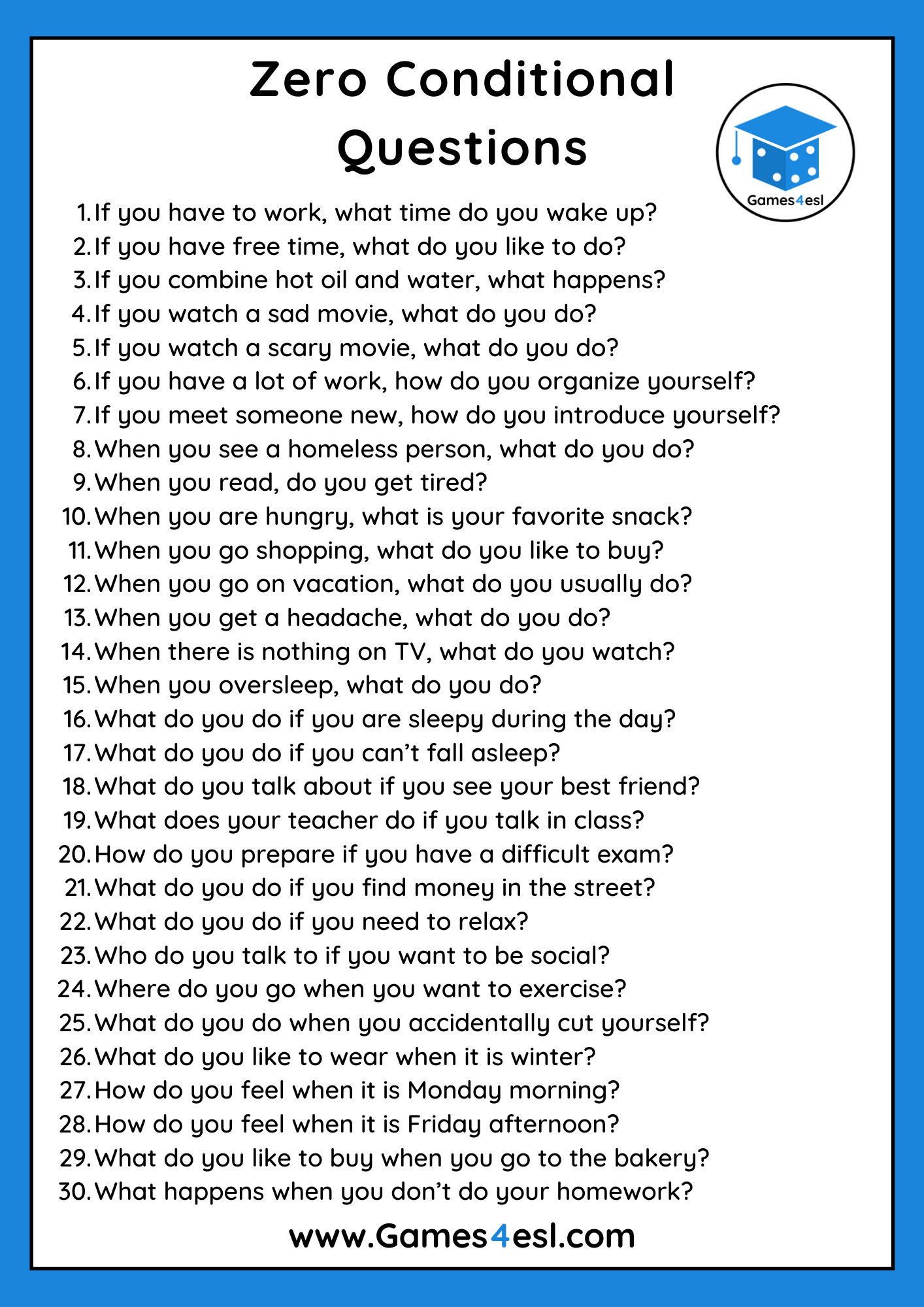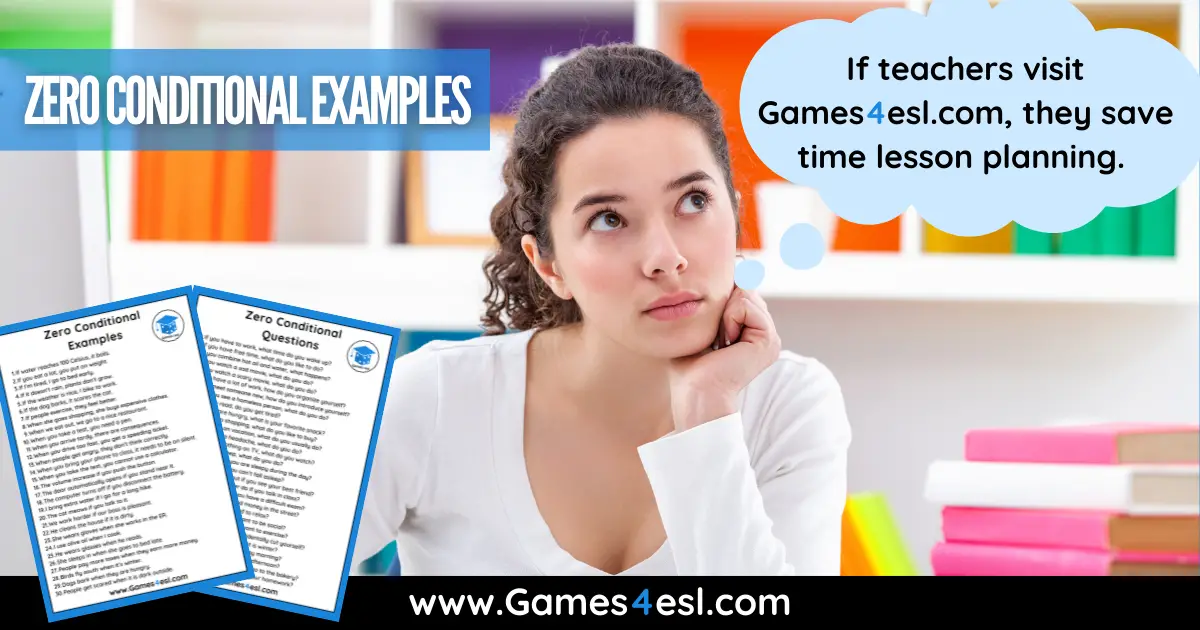Zero Conditional Example Sentences And Questions
If you’re teaching or learning about the zero conditional form, these zero conditional examples will be helpful. Like any new grammar structure, in order to speak using the zero conditional form, students need lots of practice. Below, you’ll find many zero conditional example sentences and zero conditional questions that you or your students can use to practice using this grammar structure. But first, let’s take a look at what the zero conditional form is.
What Is The Zero Conditional?
The zero conditional form is used to express a fact that is always true when something else happens. For example, the sentence “If water reaches 100 degrees Celsius, it boils.” expresses the fact that water always boils whenever it reaches 100 degrees Celsius.
How To Form Zero Conditional Sentences
Zero conditional sentences are made up of two parts, let’s call them Part A and Part B. Part A is the condition part and is formed by “if + present simple”. You can also use the word “when” instead of “if” without changing the meaning. Part B is the fact part and is formed by using the present simple. Let’s look at an example:
If you eat a lot (A), you put on weight (B).
Zero Conditional Example Sentences
Here are 30 zero conditional example sentences. All these examples are zero conditional sentences which express a general truth. The zero conditional form can be extended to other grammar forms, such as imperative sentences (“If you need to cross the street, look both ways first.“), but for now we will just focus on simple zero conditional sentence examples which express a general truth.
- If water reaches 100 Celsius, it boils.
- If you eat a lot, you put on weight.
- If I’m tired, I go to bed early.
- If it doesn’t rain, plants don’t grow.
- If the weather is nice, I bike to work.
- If the dog barks, it scares the cat.
- If people exercise, they feel better.
- When she goes shopping, she buys expensive clothes.
- When we eat out, we go to a nice restaurant.
- When you take a test, you need a pen.
- When you arrive tardy, there are consequences.
- When you drive too fast, you get a speeding ticket.
- When people get angry, they don’t think correctly.
- When you bring your phone to class, it needs to be on silent.
- When you take the test, you cannot use a calculator.
- The volume increase if you push the button.
- The door automatically opens if you stand near it.
- The computer turns off if you disconnect the battery.
- I bring extra water if I go for a long hike.
- The cat meows if you talk to it.
- We work harder if our boss is pleasant.
- He cleans the house if it is dirty.
- She wears gloves when she works in the ER.
- I use olive oil when I cook.
- He wears glasses when he reads.
- She sleeps in when she goes to bed late.
- People pay more taxes when they earn more money.
- Birds fly south when it’s winter.
- Dogs bark when they are hungry.
- People get scared when it is dark outside.

Zero Conditional Questions
Once you / your students have learned how to form zero conditional sentences, forming zero conditional questions is quite easy. These questions invite a zero conditional-response which expresses a general truth. You can form zero conditional questions by adding the auxiliary verb “do” or “does” (e.g. “Do apples grow on the tree in winter?“), or by using other questions words such as “what” or “who” (“What happens if you’re late for class?“).
Here are 30 zero conditional questions you can ask to practice speaking using the zero conditional form:
- If you have to work, what time do you wake up?
- If you have free time, what do you like to do?
- If you combine hot oil and water, what happens?
- If you watch a sad movie, what do you do?
- If you watch a scary movie, what do you do?
- If you have a lot of work, how do you organize yourself?
- If you meet someone new, how do you introduce yourself?
- When you see a homeless person, what do you do?
- When you read, do you get tired?
- When you are hungry, what is your favorite snack?
- When you go shopping, what do you like to buy?
- When you go on vacation, what do you usually do?
- When you get a headache, what do you do?
- When there is nothing on TV, what do you watch?
- When you oversleep, what do you do?
- What do you do if you are sleepy during the day?
- What do you do if you can’t fall asleep?
- What do you talk about if you see your best friend?
- What does your teacher do if you talk in class?
- How do you prepare if you have a difficult exam?
- What do you do if you find money in the street?
- What do you do if you need to relax?
- Who do you talk to if you want to be social?
- Where do you go when you want to exercise?
- What do you do when you accidentally cut yourself?
- What do you like to wear when it is winter?
- How do you feel when it is Monday morning?
- How do you feel when it is Friday afternoon?
- What do you like to buy when you go to the bakery?
- What happens when you don’t do your homework?

As you can see, the zero conditional form is super easy! In fact, it is one of the simplest grammar structures for English language learners to learn. Before you go, be sure to check out the related resources below.

